It is not unheard of for religions in science fiction and fantasy to turn out to be not as advertised. Perhaps services promised are never delivered. Maybe the “gods” involved are just a bunch of ambitious cosplayers preying on gullible marks. Maybe the priests are just grifters actively imposing themselves between the gods and the faithful. This sort of surprise revelation goes back at least as far as Edgar Rice Burroughs’ The Gods of Mars. No doubt earlier examples could be found.
Nevertheless, some works feature very real gods who take a very real interest in the world. Surely, this straightforwardness compensates for any drawbacks inherent in divine beings taking an interest in humanity? Or perhaps it does not.
Start of Darkness by Rich Burlew (2007)
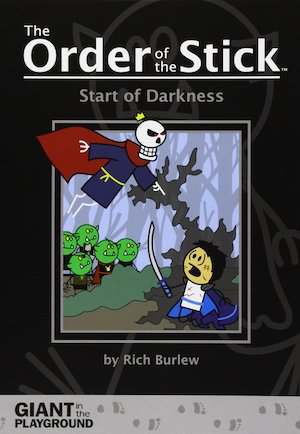
Goblins live pitiful lives, singled out for periodic massacres by the other races of their world. Supreme goblin cleric Redcloak knows this state of affairs is no accident. In this Dungeons & Dragons-based world, important characters need conflict to level up. Goblins were created by the gods as low-threat victims for the more important races to slaughter in the quest for self-improvement. They exist only to be killed.
Redcloak is determined to liberate his people. However, the goblins have just the one god, the former folk hero The Dark One. The Dark One is only barely a god. The goblins need a powerful ally. What better ally than the necromancer Xykon? Xykon is powerful but also lazy and easily distracted. Surely, Redcloak will have no trouble manipulating such a flawed human.
At least, that’s the plan.
Start of Darkness is a prequel to Burlew’s long-running stick-figure webcomic Order of the Stick. How long-running? The D&D rules being parodied are the 3.5 Edition rules. It’s hard not to be sympathetic towards Redcloak’s goals, although it could be that depending on a chaotic evil necromancer with the self-control of a toddler was a bit of a misstep on Redcloak’s part. Helping Xykon to become a lich most definitely was.
The Prey of Gods by Nicky Drayden (2017)1
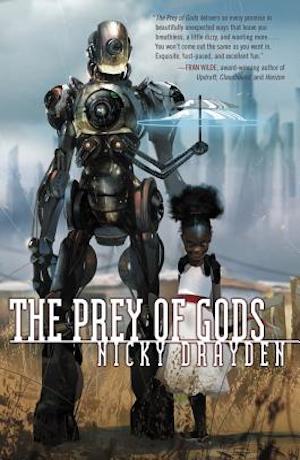
Beautician Sydney Mazwai appears human. She is in fact a god in hiding. She plans to become the greatest god of all. This requires a new age of gods, which will supersede the dismal world of sophisticated technology and highly developed economies in which Sydney is currently living.
Sydney’s plan starts off well enough. Triggering divine powers in humans isn’t difficult. Chaos will surely follow! And chaos is opportunity. Except, to Sydney’s considerable distress, chaos is also unpredictable. The humans have an exasperating tendency to create their own alliances with no regard whatsoever for the hopes and dreams of a simple predatory divine entity.
Sydney really is a god, and she really is powerful. What she isn’t is nearly smart enough to play grand architect of fate, as opposed to simply being the first snowflake in the avalanche. She’s also inclined to be a loner, which isn’t an asset when the other side is happy to gang up on her.
Gods of Jade and Shadow by Silvia Moreno-Garcia (2019)
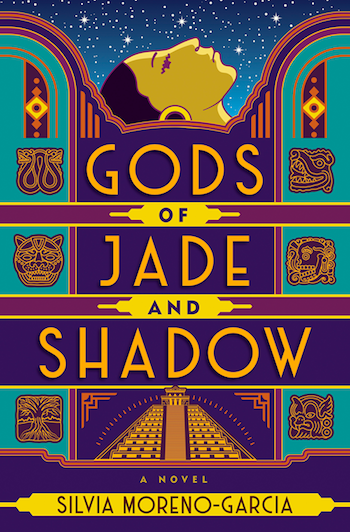
After laboring for years as an unpaid servant, poor cousin Casiopea Tun discovers that the bequest she was promised by her grandfather Cirilo was a lie. Outraged, Casiopea breaks into dead Cirilo’s locked chest, hoping to steal the wealth she will need to start a new life far from her unpleasant relatives. She instead finds a trapped god.
Hun-Kamé, Lord of Xibalba, was struck down, hacked to pieces by his jealous twin Vucub-Kamé, and the pieces locked in Cirilo’s chest. Casiopea has freed him but she did not make him whole. Hun-Kamé needs to find his missing ear, finger, and eye, and he needs to do so soon. The bond between them allows Hun-Kamé to draw on Casiopea for sustenance… and a single mortal cannot feed a god for long.
The difference between Casiopea and Hun-Kamé (aside from the whole mortal vs. divine entity thing) is that had she never met the god, Casiopea would still have escaped her dreadful relatives, whereas if Hun-Kamé had never met Casiopea, Hun-Kamé would still be stuck in a locked chest.
The Girl Who Fell Beneath the Sea by Axie Oh (2022)
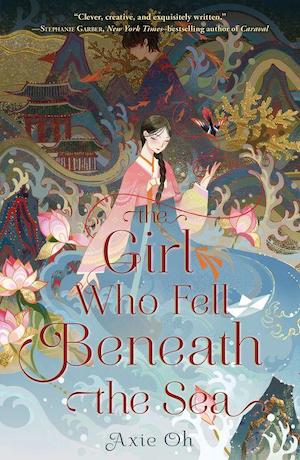
Mina’s people have a simple tradition to ward off ill fortune. Select a beautiful woman and present her to the Sea God’s dragon as a potential bride for the Sea God. The sad fact that the ritual does not work, that the Sea God appears to have abandoned his people, and that the brides vanish into the ocean without any noticeable benefit to the people is no reason to abandon this time-tested custom.
To save her brother Joon’s lover Shim Cheong, Mina volunteers to be the next bride sacrifice. This earns her a ticket to the court of gods, and a chance to discover the answer to an important question: Why does the Sea God never reward the ritual?
The answer is not “there are no gods and legions of women have died for no purpose.” Women definitely died but the gods are very real, if of little immediate utility to mortal people. The question not answered is “why do humans keep throwing women into the ocean when it never works?” I guess people get attached to their customs—even the terrible, absurd ones.
The Sacrifice by Rin Chupeco (2022)
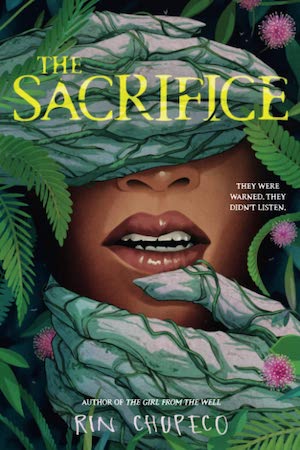
The island of Kisapmata is home to a living god, the Diwata. Most Filipinos prefer to respect the Diwata from a distance. Alon is the exception. Alon lives on Kisapmata. As a consequence, Alon is present when the visitors arrive.
The Hollywood crew has a simple dream: film a lurid show titled The Curse of the Godseye and in so doing rebuild the ailing career of reality star Reuben Hemslock. Unable to dissuade the crew from their plan, Alon agrees to a post as their consultant. He cannot save the resolutely foolish from the consequences of their actions, but Alon can at least witness their fate.
The dog survives. Many of the humans do not but at least there is more at work here than arrogant filmmakers too proud to heed warnings. Bad decisions are made but for reasons that seemed logical at the time.
There are, of course, many novels out there that feature actual, living gods. These are just five. Perhaps you have your own preferred works. If so, the comments are below.
- The Prey of Gods used a marketing technique so effective that I marvel at its rarity. But that is a subject for another essay.










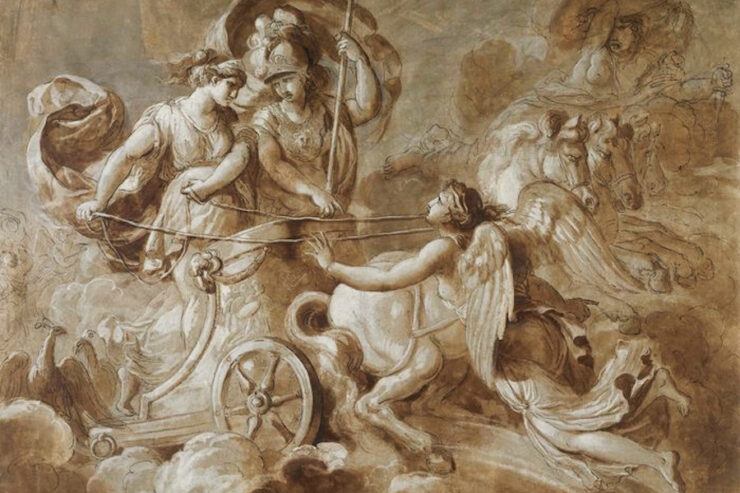
I would still like to see a version of Lord of Light where the real Hindu gods show up.
… as well as the crew of high-tech scammers and fakers we see in the actual book? That would be an interesting meeting. I can’t imagine the real Hindu gods would be especially happy. (Their worshippers, even less so, after they got over their confusion.)
A good prospect for crossover fanfic :)
The “Thieves’ World” shared universe stories had Real Gods who, by the nature of the stories, were more to be avoided and placated than loved, IIRC.
In Jo Walton’s Thessaly trilogy the gods cause some problems, though not as much as the theists do.
The gods in He Who Fights With Monsters are central to most of the conflict. They usually can only act through their followers, but since they can speak to people directly and give their followers extra power, they tend to have a lot of them.
Fred Saberhagen’s The First Book of Swords (and its two immediate sequels) come to mind here as well.
That series came to my mind, too, though I couldn’t remember the name.
I guess there are Gods in the background of Fritz Lieber’s Lankhmar too (I seem to remember Ningauble being described as created by or serving a deity for example). Not read them all so not sure if they play any major role at some point.
The gods of Lankhmar definitely show up at one point, but are not very powerful. I think other gods of Nehwon make themselves known from time to time but do not play a major role IIRC. Some of the Norse gods appear in a later story and do play a significant role.
There’s the gods in Lankhmar (plentiful, unimpressive) and the gods of Lankhmar (terrifying).
The Copper Promise (and sequels) and the Black Company books feature Gods and Goddesses (not often nice ones). And the Discworld has its fair share of them…(hi Anoia rattles drawer)
“Chaotic evil necromancer with the self-control of a toddler” — Something similar is happening here in the United States.
No, we just got rid of a rather inept and witless lich.
Not being a D&D player, but doesn’t become a high-level necromancer require some form of self-discipline?
No, he’s a sorceror, which means he was born with the ability to do necromancy.
Other magic users include wizards, who learn how to do magic through intense study, clerics, who do magic with prayer, and warlocks, who make pacts with powerful entities in exchange for magic.
Some of these paths to magic require more self-discipline and intelligence than others.
One of my D&D characters was basically Bertie Wooster, if Bertie and the rest of the Drones Club had made deals with Hastur for arcane power.
So basically Bertie Wooster if Jeeves were actually Mephistopheles?
Xykon has a natural knack for death magic. Redcloak can sort of keep Xykon pointed in the right direction until Xykon becomes a lich, after which it becomes clear Redcloak may have seriously miscalculated.
Except at that point he’s all in, so he still won’t reconsider his plans. Whatever you say about Redcloak, you can’t doubt his commitment.
Lois Bujold’s world of the Five Gods has a religion that I would not mind belonging to.
“The gods have no hands in this world but ours. If we fail Them, where then can They turn?”
Sorcerer Penric, although his powers are linked to the Bastard god, tries very hard to avoid the Bastard’s attention as He is the god of disaster.
… and also because He has a very, ah, original sense of humour. (And because His only real interaction with demons is to release them, occasionally indirectly point them in suitable directions, and eat them. So direct interaction with the Bastard in particular is rarely a good thing for the demon, and Penric definitely values his union with Des. Merely knowing that the Bastard does too doesn’t mean that they want to tempt fate… or terrify Des unless he absolutely has to.)
In Terry Pratchett’s Pyramids, while the book focuses on Pyramids at the end the real Egyptian (historically accurate) gods are released and destruction and mayhem, including battles between gods, abound.
not to mention Small Gods (my favorite Discworld book)
And the Last Hero, although that’s more about causing trouble for Gods.
While Small Gods is also my favorite Pratchett book, I think my favorite god from the books is Nuggan from Monstrous Regiment, who is apparently old and increasingly insane, so that each week a new set of normal things, such as applesauce or the color blue, is declared to be an Abomination unto Nuggan. I say apparently because it’s never explicitly ruled out that Nuggan hasn’t just buggered off elsewhere and a mad priest somewhere is just releasing the random proclamations.
Something is writing them into the Book. It seems to be some sort of shade of Nuggan — the only evidence we ever have that gods can have any sort of afterlife. (Maybe this is just the small god that’s all that’s left of him: we know that extinct gods often/always dwindle back down again.)
Nuggan’s dead. The bard killed him in The Last Hero
Well, I would throw in Jennifer Fallon’s Tide Lords
Excellent suggestion. Bored suicidal gods are not good companions. Their family problems are out of this world.
There’s also Gods Behaving Badly (or the infamously bad and never released movie version, but the book itself deserved better), Martin Millar’s Goddess of Buttercups and Daisies, and roughly half of the stuff Tom Holt wrote
Diana Wynne Jones’ Eight Days of Luke is about what happens when a boy called David accidentally frees someone whose name isn’t quite Luke. Other more or less friendly Norse gods show up over the next week, as well as a great deal of trouble…
Honourable mention to the Iliad of Homer, the Grandfather and Great-grandfather of ‘Gods behaving badly’ fiction.
The Godmakers (1972), by Frank Herbert. Blessed is Orne.
Robert Jackson Bennett’s trilogy that starts with City of Stairs has both great characters as well as an interesting, unsettling relationship between the gods and the humans. I read it years ago and still think about it and reread it every few years.
Can a discussion of gods or divine mythos ever be discussed in 2025 without N.K. Jemisin’s dazzling debut novel The Hundred Thousand Kingdoms?
It’s the book that’s always missing from far too many discussions, despite Jemisin’s staggering contribution to SFF. It’s also been in my Top Five from the day I first read it, way back in 2010-11, and came away rather proud for the very first time in my life (I was 21-22 y.o. at the time) that a black woman had written something so rich, so engaging, so wrathful, and utterly brilliantly fantastical–and that I had the good sense and great pleasure to read it while it was still hot off the press.
Nahadoth & Sieh are indescribably fascinating original gods. I would fight the world for them. Especially given their role in Yeine’s life.
Agree. The whole series is great.
A couple of novellas –
Lester del Rey – “For I am a Jealous People!”. Earth is invaded by marauding aliens. Remember that old adage in times of war, “God is on our side”?
TED Klein – “Nadelman’s God”. As a student, Nadelman wrote a long, pretentious poem about the rise of a new, dark god for the modern age for his college literary magazine. Years later, now a successful advertising executive, he is amused when a Heavy Metal band stumble across the poem and use it as the lyrics for a lengthy track on their latest album. He’s less amused when a deluded fan of the band, who takes the lyrics very seriously, tracks him down seeking Nadelman’s assistance in summoning the “god”….
In the section on the sacrifice, there’s a reference to a dog surviving. While that’s always a good thing to know about a movie or the like, it feels out of place here. Should that be a surviving god?
James is fond of animals. I’m going to say that he has a bit of an aversion to Chekhov’s Dog as Urban Dictionary puts it, the dear animal which suffers in a story as a way to motivate human characters. A point of view is that humans should do their own suffering. So all those stories where the protagonist is spurred to action by what happened to their dog or cat are not favoured, I venture to say.
I’ve always loved Thorne Smith’s The Night Life of the Gods, who come to life from their statues and proceed to live it up (and thumb their noses at the cops) all over 1920’s (or maybe 1930’s, I’m not sure) New York City.
A skim doesn’t turn up any hints as to when Night Life was set but it was published in 1931.
I wonder what would have happened had the stone to flesh ray been turned on two identical statues of the same god?
Smith’s novels generally had a contemporary (ie, 1920s-30s) setting. They also usually involved a lot of heavy drinking – as indeed did Smith’s own life, which I suspect contributed to its brevity.
There was a feature film adaptation of “Night Life” circa 1935, though I don’t think it’s ever had a legit video release.
While probably best known for his “Topper” novels and the posthumous “I Married a Witch”, as well as their Tv / film adaptations, Smith published numerous novels of light, humorous fantasy. Lovers of Wodehouse will probably enjoy them. I suspect he’s pretty obscure now; I’m not aware of any mass-market reprints of his work since a set of Ballantine reprints since the late 70s (shows how long ago it was that I say “Ballantine” rather than del Rey), though I’d be happy to be proved wrong.
The 1970s MMPB are late enough to be Del Reys, by about three years. I think it was part of Smith’s last hurrah in the public mind, because that was around the time of the most recent TV/movie adaptation of his work that I know of, 1979’s massively unsuccessful Schuck/Gless Turnabout.
Now that I think about it, I wonder if the del Reys heard the TV show was coming and took it as a sign there was a market for Smith. As far as I know, there’s never been a proper Nevala-Lee-style text on the del Reys, which is a pity.
The Del Rey MMPB are the most recent ones listed in the ISFDB but there are recent(ish) ebooks from Open Road Media. Ebooks seem to have replaced MMPBs.
The Forgotten Realms trilogy in which the gods are made mortal for a time (and blow up when they die) is pretty fun. Nothing deep.
P. C. Hodgell’s Kencyrath series has a slew of gods local to the planet that our heroes and their recent ancestors are interlopers upon. Heroine Jame ends up accidentally married to one (the Earth Wife) by stumbling into the middle of an annual ritual meant to fill that role (she stumbles into numerous bizarre situations in the course of the series and frequently is seen staggering away from the smoking ruins of some recently visited site where divine intervention of some sort went awry).
Very real gods in fantasy, science fiction and horror are most often portrayed as comic book superhero type beings, with maybe an extra jolt of power to lift them above the run-of-the-mill costumed character. I guess that’s a continuation of pagan traditions where forces of nature get personalized as recognizable human beings but with added supernatural oomph. So of course these gods have their believers among the fictional characters, since people can encounter them face to face and are probably being prudent not getting on their bad side. Zelazny has many of the superhero type gods in his fiction. And then there’s the whole Malazan Book of the Fallen and its associated tales (Erikson & Esslemont).
What we see very little in genre fiction character portrayals are the devout believers in a god/gods that doesn’t/don’t overtly manifest in a way that everyone can see. Which is actually the majority, however slim, of our current population. We see a lot of portrayals of ignorant and superstitious louts, murderous fanatics, power-hungry crooks peddling fraudulent claims, and the occasional inscrutable New Age platitude spouter, but few normal believers. In fact, we probably see many, many more tales of the future where no one evinces any belief in religion or voices spiritual concerns than ones where that’s not the case. Very odd, especially given the number of genre authors who were devout believers, that this large population is marginalized.
The protagonist of Gene Wolfe’s Latro series (Latro in the Mist, A Soldier of Sidon) has a head injury which prevents him from laying down long-term memories (his memory only retains events of the preceding twenty hours or so, and all memories of his earlier life are inaccessible), but, perhaps as a consequence of this, can see gods and permit others to see them when he touches them. These gods are mostly from the Greek pantheon (he is initially wandering around Greece in the aftermath of Xerxes’s invasion, although he visits Thrace and Egypt and sees local gods there), and his interactions with them are what one might expect of a believer living in that time, although due to his amnesia he generally doesn’t know who they are when he first encounters any of them and is often slow to realize their true nature.
Wolfe was a devout Catholic, and while this doesn’t usually come out explicitly in his fiction, it is frequently evident in the themes he deals with. Redemption and the nature of a redeemer, for instance, in The Book of the New Sun.
Very real gods in fantasy, science fiction and horror are most often portrayed as comic book superhero type beings, with maybe an extra jolt of power to lift them above the run-of-the-mill costumed character. I guess that’s a continuation of pagan traditions where forces of nature get personalized as recognizable human beings but with added supernatural oomph.
Not really and also sort of. The fact of the matter is that very few Anglophone authors have any actual experience of living polytheist and/or animist traditions and have no real idea of how they operate for believers. Their perceptions are shaped by questionable translations of parodies of Classical Greek religious practice (in many cases third-hand summaries of the said questionable translations) and Imperial Roman propaganda, and for the last half-century Dungeons and Dragons, which is a whole discussion on its own. Also literal comic books, of course.
Now, it’s true that many gods do, in many ways, behave a lot like humans with too much power and immunity from most consequences,(one of my common mottos is All Gods Are Bastards) but this isn’t universal, and many embodiments of natural forces are alien in one or more ways. Often ways that end up hostile to humanity, but not out of spite or caprice necessarily.
Very odd, especially given the number of genre authors who were devout believers
IME, authors who are [known to be] devout Christians (which includes the vast majority of notably religious Anglophone authors, as noted above)
tend to lean heavily towards the fantasy side of things, and typically include provable interventionist deities therein, precisely because they believe in one, so this seems plausible to them. When they write sf, it still tends heavily towards the mystical/allegorical, where, again, the belief is expressed in the setting (viz. A Wrinkle in Time). Exceptions include Bujold, as Jenny mentioned, and Christopher Stasheff, I don’t recall religiosity of any sort playing any role in his Starship Troupers (sic) books, and the Warlock of Gramarye is a confirmed skeptic in the face of the Christianity of the locals.
When I first met Cordelia Naismith (Bujold, the Vorkosigan Saga) mumblety years ago, I audibly gasped. I had had it up to the teeth with cable TV depictions of Christians which were either “corrupt and/or farcically prudish American Protestants, denomination unspecified” or “Catholic priest who inexplicably talks like a Gothic novel in a modern setting.” And here’s Captain Naismith, who simply believes and has faith.
Megan Whalen Turner’s Attolia series has gods who are influencing/manipulating geopolitical affairs via various selected individuals. Those of our protagonists who’ve been let in on the reasons why appreciate the motives but are sometimes rather put out at the specific means.
Rivers of London can go here too, one of the issues is a conflict between the upstream and downstream deities of the Thames and their respective children/tributaries, and they continue to intefere throughout the series.
I submit 2024’s unusual The Saint of Bright Doors by Vajra Chandrasekera, whose protagonist is the son of the god known as The Perfect and Kind. Raised by his mother as a weapon of vengeance against his father, Fetter escapes to the city of Luriat in an effort to forge his own destiny. Among the many colorful characters he encounters on this journey is an entire support group dedicated to folk like him – the unchosen, the spares bred and raised as backups to the chosen ones, those designated as heirs to the divine power or channels of communication to the deity (or deities) of the religion in question. Eventually, Fetter’s father decides to take a more personal interest in the snarled mess of Luriat’s religious/economic/socio-political affairs. Hijinks ensue. Luminous and strange, this book is ultimately a story about family and transformation in the face of intergenerational trauma.
Hailey Piper’s ‘No Gods for Drowning’ was a good look at what happens to a land that was literally built on the miracles of gods when the gods leave it behind. Solid urban fantasy with heavy overtones of climate change and absolutely brutal at some points.
That reminds me to mention Max Gladstone’s Craft Sequence, in which gods and their miracles sustain a number of societies, while others are operated by necromantic corporations used by lich-kings to replace what the gods they overthrew used to do. (Imperfectly)
Hell Is the Absence of God, a 2001 novelette by Ted Chiang, features angels wreaking indiscriminate havoc on the devout.
“God is not just, God is not kind, God is not merciful, and understanding that is essential to true devotion.”
If you squint the angels take on the appearance of vengeful gods.
Chiang won the Hugo, Nebula, and Locus awards for this disturbing work.
Adding an unmentioned god to the many cites of Discworld: Wintersmith, who in the book of the same name becomes enamored of Tiffany and starts taking more and more of the year under his domain.
The first suggestion in the article made me immediately think of Jig in Goblin Quest (by Jim Hines) who is the only worshipper of his god, so his god definitely needs him. Jig is forced to aid a group of jerk off adventurers who meet the fate they so richly deserve.
Arthur Machen’s “The Great God Pan” is just what it says on the tin. More recently, the title of Peter Beagle’s Summerlong is a hint as to the nature of some of its characters. And who could forget Yottle from The Circus of Dr. Lao? An omnipotent, omniscient, omnipresent lump of bronze.
How about Divine Misfortune by A. Lee Martinez? A world where you need divine favor to get ahead – a couple chooses Luka, the raccoon-headed God of Luck to be their deity, only to find that not only did he show up at their house, move in, and eat their food, but he also brought the attention of his ancient, implacable enemy. Humorous and smart.
The Malazan Book of the Fallen (Gardens of the Moon) would be a good mention.